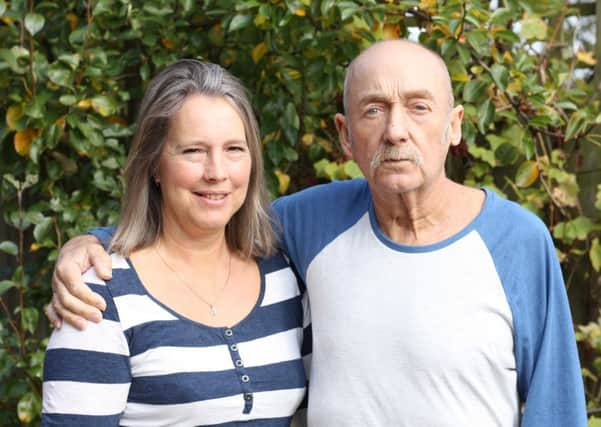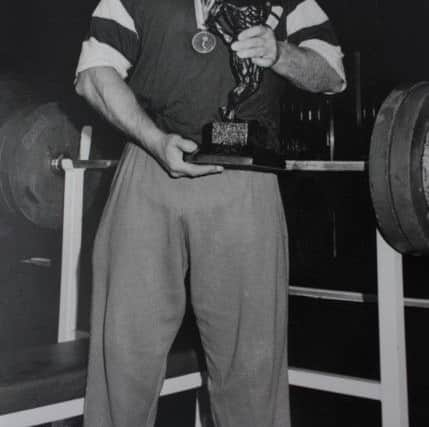How Hull's shipbuilding industry cost workers their health


The 1950s was a boom time for British shipbuilding. The government was investing heavily in the industry which was providing much needed skilled employment after the Second World War and which looked set to give teenagers like Colin Russell a career for life. He was just 14 when he left school and walked straight into a job on Hull’s thriving docks. The money was good. So was the craic, but what he didn’t know was that he was working alongside a silent killer.
Asbestos, the natural fibrous rock, had long been used for insulation and while there were suspicions that the material was unsafe, those concerns were hushed up from the army of workers on which the industry had been built.
Advertisement
Hide AdAdvertisement
Hide Ad“When I was in training, I asked my supervisor if asbestos was dangerous and he told me it wasn’t,” says Colin from Sutton-on-Hull. “We were all misled. The government knew how bad it was, but it was in everything. It was just part and parcel of the shipbuilding industry.”


Although voluntary bans on the use of asbestos were introduced in the 1970s, it wasn’t until 1985 that two types - amosite and crocidolite - were formally outlawed in the UK and it took another 14 years before the use of a third type was prohibited. By then asbestos had been used in the construction and manufacturing for decades and for Colin and thousands of others it was too little too late.
Exposure to asbestos can lead to an aggressive type of lung cancer known as mesothelioma and the UK has one of the highest rates of the disease in the world. During 2014, 2,233 people in England died from mesothelioma. Of those 221, were living in the Yorkshire and Humber area. Every year a further 2,000 to 3,000 are diagnosed and in May, Colin a former record-breaking weightlifter who spent his whole life training at various gyms in Hull, was one of them.
“They used to call me The Kingpin,” says the 60 year old, who is telling his story as part of Lung Cancer Awareness Month. “I’ve never smoked or drunk excessively and I regularly beat some of the younger members of the gym at press-up challenges. Funnily enough it was because I had always been so fit that I first noticed something was wrong.
Advertisement
Hide AdAdvertisement
Hide Ad“Earlier this year I’d just come back from Spain with my partner Allyson. I’d been as right as rain, but when I went to the gym and tried to do my usual circuit I suddenly found I was out of breath.”


Colin went to see his doctor who also noticed a swelling in his stomach and he was sent for an X-ray. When only one of Colin’s lungs appeared on the images it immediately raised alarm bells with radiographers and he was referred to Hull Royal Infirmary.
After further investigations he was diagnosed with ‘pleural effusion’ which meant that excessive fluid was building around his lung. The fluid was drained and after three days in hospital he returned to his job as transport manager at Rowcol Engineering, but there was worse to come. Forced to return to hospital on two further occasions when the fluid returned, the pressure on his heart and stomach was so severe he was told he had been lucky not to have suffered a major heart attack.
“While I was in hospital, they took a sample of tissue from my lung and after finding cancerous cells they diagnosed mesothelioma,” says Colin. “They caught it at an early stage, but it was already too late. They told me the disease was terminal.”
Advertisement
Hide AdAdvertisement
Hide AdIn an effort to prevent the cancer from spreading any further, Colin has undergone a course of chemotherapy. The treatment has its own side-effects, but while he has been suffering from sickness, vertigo and pain in his feet, he remains hopeful that it will ultimately buy him some valuable time.
“When you’re told you’re going to die everything grinds to a halt. I lost interest in everything. In those early days after being diagnosed I couldn’t even bring myself to read a magazine or the newspaper. I just thought, ‘If I’m going to die, what’s the point?’
“But I’ve had good support from friends. The sickness means that I can’t go out and do anything, but I am hoping that with the help of the hospital I will get some quality of life back. Maybe a weekend away or a day out. Now it’s the small things which count.”
Colin has been with Allyson for 10 years. Between them they have five grandchildren and while they were looking forward to enjoying their retirement together they are now preparing for Colin’s death.
Advertisement
Hide AdAdvertisement
Hide Ad“You leave school, you go to work, you progress in life and then you aim for retirement,” he says. “We had all sorts of plans. Now instead we’re sorting out all the loose ends. I’ve been in this house since I was a lad, but we might have to move if the time comes that I can no longer get up the stairs. As well as dealing with the illness and the treatment there are so many other things to think about.”
Colin is also taking part in a Yorkshire Cancer Research investigation into cancer inequalities in Hull and East Yorkshire. The five year project, funded by a £750,000 award from the charity, aims to improve the early recognition of people with cancer, reduce the number of people diagnosed as an emergency and determine the needs of all advanced cancer patients so that they receive appropriate care in the most appropriate place.
“Cancer patients in the UK are less likely to survive than those in other parts of Europe, Canada and Australia and survival is particularly bad in socio-economically poor areas like East Yorkshire,” says Una Macleod, the Hull GP and Professor of Primary Care Medicine at Hull York Medical School who is leading the project.
“However, survival is not the only important issue - how people experience cancer and the care they receive is also very important for all patients, especially those with advanced cancer. The aim is to ensure that all people with cancer, whether they are rich or poor have high quality care.”
Advertisement
Hide AdAdvertisement
Hide AdColin is one of a number of patients whose experience of living with cancer is now being tracked through questionnaire, in depth interviews and analysis of medical records.
“We will do anything we can to help others,” he says. “People often wonder whether it’s worth keeping fit when your older. My advice to anyone would be, ‘get a little exercise’. Even if it’s only walking, if you know your own ability you will have something to measure your health against. If you know your own body, problems are much easier to identify.”
Colin isn’t quite sure what the next few months will hold, but he is determined to enjoy the life he has left.
“I don’t feel bitter about what has happened. It’s done and that’s it,” he says. “Some people might feel angry, but I honestly don’t. We’ve had tears and upset, but you’ve just got to accept what is happening. Given what could have happened I’m just so grateful to the NHS and the staff who saved my life. I can’t sing their praises enough. They gave me a future.”